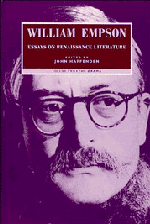Introduction
Published online by Cambridge University Press: 03 February 2010
Summary
‘The plan of one Shakespeare book and then one Jonson etc. book seems to be an admirable one, settling a whole area’, William Empson wrote to Cambridge University Press on 5 November 1981. ‘But of course I must arrange them as real books … ’ He had been proposing to compile various collections of his essays since as early as 1958; but in the event, after publishing Milton's God (1961), he went on to compose an extraordinary number of further essays in several major areas – specifically those that have now been gathered in Using Biography (which he had just finished at the time of his death in April 1984), Essays on Shakespeare, edited by David B. Pirie (Cambridge University Press, 1987), and a heartening essay entitled Faustus and the Censor: The English Faust-book and Marlowe's ‘Doctor Faustus’, edited by John Henry Jones (Oxford: Basil Blackwell, 1987). Furthermore, the grand assemblage of items in Argufying: Essays on Literature and Culture (London: Chatto and Windus, 1987) shows that Empson remained tirelessly productive in the later years: his habits of work and his output were as continuous as they were wide-ranging.
The present collection of essays on Elizabethan and Jacobean drama is the second part of a two-volume edition of Empson's work on Renaissance literature; this twofold package is designed to complement the canonical volume Essays on Shakespeare. In letters to friends, Empson announced this volume – which he called by the working title Some Elizabethan Plays and their Stage (he never quite mastered the knack of devising snappy titles) – well over a decade ago.
- Type
- Chapter
- Information
- William Empson: Essays on Renaissance Literature , pp. 1 - 14Publisher: Cambridge University PressPrint publication year: 1994



